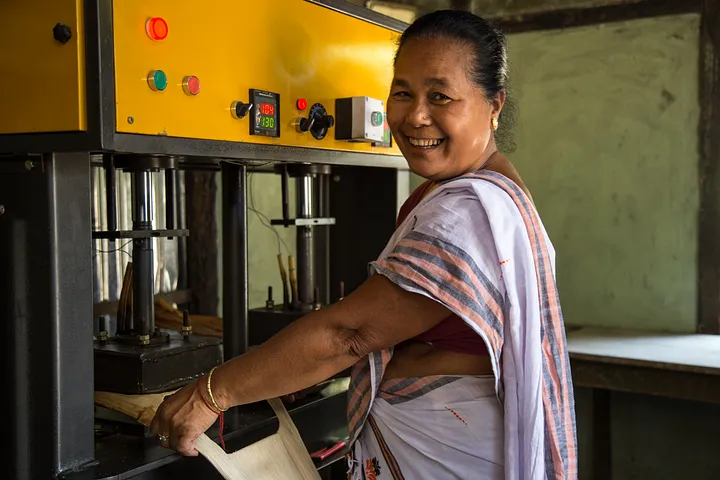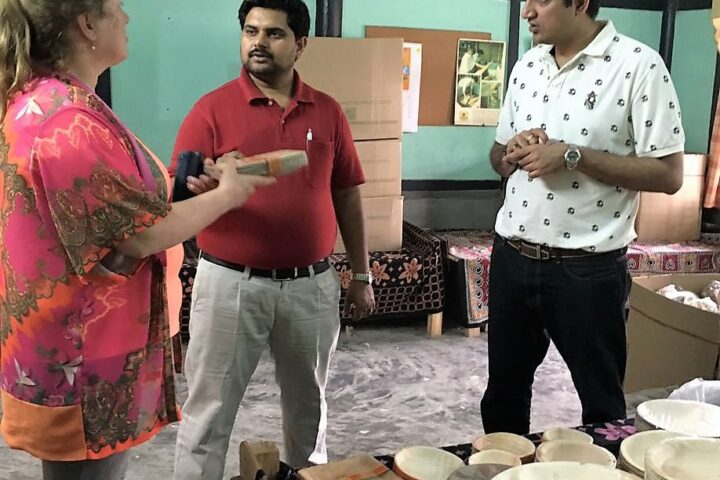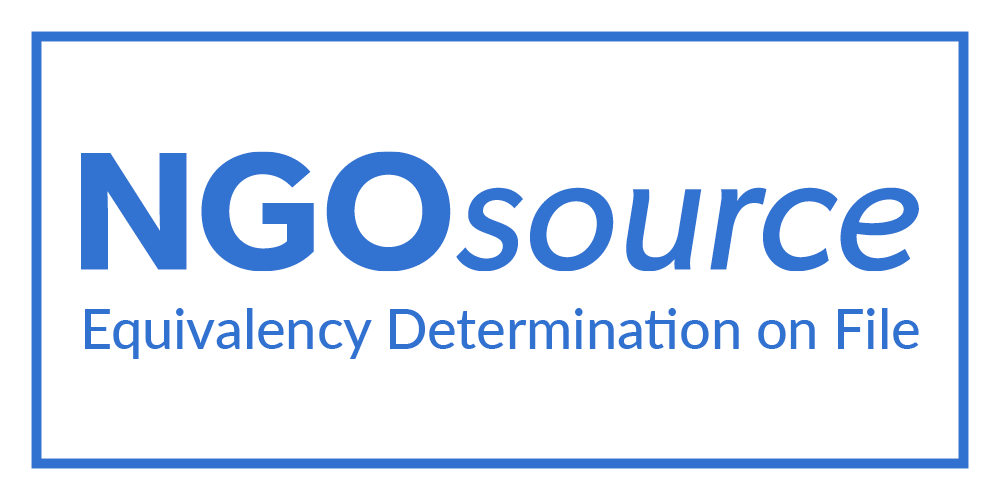Pratima’s inspiring story by our social enterprise partner Tamul Plates was reprinted from LinkedIn
Rural women entrepreneurs from North East India are emerging as a powerful force for change, transforming not only their lives but also their communities. Often from marginalized sections of society, these women face significant social, economic, and cultural challenges. Yet, they are steadily overcoming these hurdles to establish successful micro enterprises. Their stories reflect resilience, innovation, and an evolving entrepreneurial landscape that is critical for the country’s economic growth. Pratima Rabha’s journey is a shining example of this transformation.
A collaboration to pilot tribal village enterprises
In 2018, Tamul Plates Marketing Private Limited and Dhriiti – The Courage Within collaborated under the Pragati Program, funded by the InterGlobe Foundation, to pilot 30 arecanut leaf plate-making units in tribal villages. This initiative aimed to empower women to become entrepreneurs. Over years of working in the region, both organizations observed that while women played a central role in nurturing their families, their contributions to family income often stemmed from small, inconsistent income-generating activities that were insufficient to sustain their households year-round.
Arecanut leaf plate making offered an ideal solution for rural tribal women who aspired to contribute to their family’s finances, ensure their children’s education, and save for emergencies. This sustainable livelihood opportunity not only addressed economic needs but also paved the way for their empowerment, exemplified by Pratima Rabha’s remarkable journey.
Tentative at first, then rallying others
One chilly morning, shortly after Women’s Day celebrations, we met Pratima Rabha, sitting on a field with her friends. Our purpose of visit was to introduce her to a project involving arecanut leaf plate making and areca sheath collection which we wanted to pilot in her location. Alongside us was a potential funder for the pilot initiative. Despite listening politely, Pratima’s initial response was one of disinterest. Undeterred, we promised to return for further discussions, encouraging her to share the concept with her self-help groups and peers.
A few days later, we returned to find Pratima slightly more engaged, though riddled with many queries. The concept of collecting and utilizing areca sheaths to create eco-friendly tableware that could replace plastic and styrofoam plates was unfamiliar in her village. Still, our team pressed on.
As monsoon rains began and sheaths fell in abundance, Pratima rallied 15-20 women in her village to start collection. After initial setbacks we saw the activity gaining traction. The women were attracted to the idea of generating an income from an abundantly available waste material and on the spot payment.
Steering their families to stability
When the time came to launch operations, many women in the village were already interested in the sheath collection activity and some even wanted to move on to the production of the areca plates and bowls. As we organized awareness camps in the villages, Pratima ensured her group members and many other women in the village were present to learn more about the activity.
Pratima’s zeal and unwavering determination shone through a rigorous selection process, leading her to emerge as a top candidate for the pilot program.
When the first machines arrived, Pratima’s excitement was palpable. She proudly produced her first areca leaf plate during training and took it home to show her community. Despite facing skepticism and ridicule particularly over a woman in her fifties using an electric machine Pratima remained steadfast. Her resolve was driven by a desire to uplift her family out of poverty and inspire other women like her. Her only desire was to never go back to the days of being a daily wage labour and steering the family towards growth and stability.
By January 2019, Pratima had installed machines at her home and commenced production. Over six years, her average monthly income of ₹10,000 translated into a cumulative earnings of ₹10,00,000.
Overcoming great challenges
During the COVID-19 pandemic, when livelihoods in Pratima’s village came to a halt, Pratima’s business sustained her community. She continued supplying products to Tamul Plates Marketing Private Limited , supported families in need, and distributed essential kits to 25 families. Those who once doubted her now lined up at her doorstep, selling areca sheaths for survival.
In 2023, a cancer diagnosis posed yet another challenge. Undeterred, Pratima hired her daughter and delegated machine operations ensuring her unit remained functional during treatment. She utilised her savings from her areca leaf plate production income and underwent treatment. Not only did she recover, but she expanded her operations, adding another machine to double production.
Getting recognized
This year, in December Pratima fulfilled her long cherished dream of boarding a flight and travelling to Delhi. Invited to speak at a panel discussion in Delhi, Pratima shared her story—clad in a traditional Assamese mekhela chador, speaking her native tongue. She represented countless underrepresented tribal women, embodying their dreams of empowerment and recognition on a national stage.
Stories like Pratima Rabha’s underscores the qualities that define true leaders and change-makers and the key role that organisations like Tamul provide to propel such individuals to become frontrunners in their societies.
- Vision and Determination: Despite limited formal education, women like Pratima demonstrate an incredible ability to envision possibilities beyond immediate challenges. Her journey began with doubt, but her commitment to securing a stable future for her family drove her to master new skills and embrace entrepreneurship. Tamul Plates Marketing Private Limited and Dhriiti – The Courage Within recognized this potential, identified the rural women entrepreneurs for the pilot project, each with the tenacity to become successful rural arecanut leaf plate producers.
- Resilience in the Face of Adversity: Pratima’s story is one of unwavering resilience. From societal ridicule to financial losses and health challenges, she faced every hurdle with grit. During the COVID-19 pandemic, Tamul’s product buy-back guarantee shielded producers like her from market disruptions. Not only did she sustain her own family, but her production unit provided crucial income opportunities for other households in her village.
- Community Leadership and Sisterhood: Pratima’s focus extended beyond her personal growth, embodying the spirit of collective progress and generational development. From the early days of the Pragati Program, both Tamul and Dhriiti prioritized building a sense of cohesiveness among the participants. By addressing group dynamics and fostering a shared vision, they nurtured an environment of sisterhood and collaboration. The program encouraged women like Pratima to rise as community leaders, uniting others in their village to embrace opportunities for income generation and empowerment. Pratima’s unwavering commitment to uplifting those around her has inspired countless women to dream bigger and contribute meaningfully to their families and communities.
- Adaptability and Innovation: Pratima’s ability to adapt to new technologies, such as operating hydraulic press machines, highlights the agility and determination necessary for sustainable growth. With Tamul’s support, which included intensive training, regular refresher sessions, and doorstep technical assistance, she overcame initial doubts and established herself as a skilled operator. This support minimized downtime and maximized productivity, enabling her business to thrive.
Rural tribal women of Northeast India, like Pratima, have the zeal, ownership, and capacity to transform the social fabric of their communities. They possess the resilience and vision necessary to drive meaningful change. However, they need the guidance and resources provided by organizations like Dhriiti – The Courage Within and Tamul Plates Marketing Private Limited to propel them toward sustainable growth and empowerment.
Through a blend of technical training, financial support, and community-building initiatives, organizations like Tamul and Dhriiti have created a nurturing ecosystem where women like Pratima can thrive as entrepreneurs and leaders. This collaboration demonstrates the power of partnership in unlocking the untapped potential of rural women, fostering a legacy of progress and hope for generations to come.
Women on Wings has consulted with Tamul Plates since 2015 so that they may scale and employ more women living in rural India.



